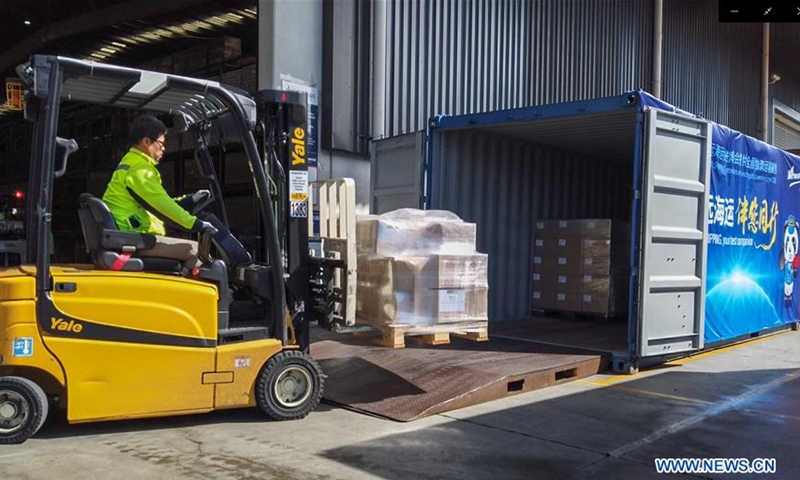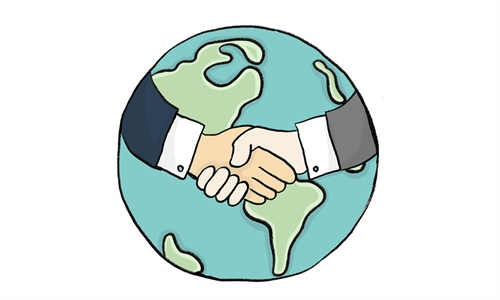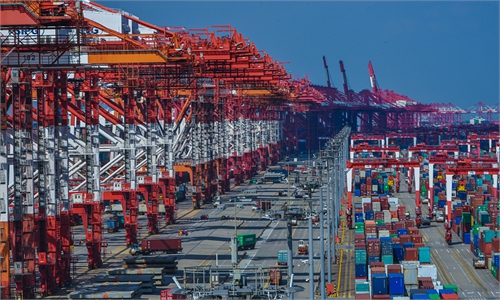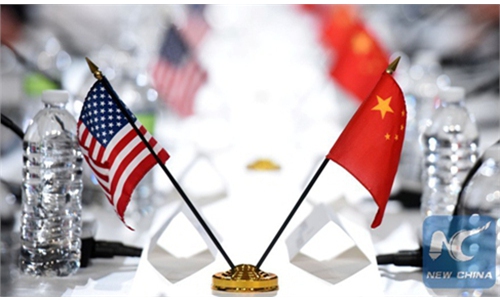Biden’s trade nominee talks tough on China, but phase 1 deal implementation shouldn’t stunt re-engagement

A worker forklifts New Zealand products into a container to be shipped to China for the third China International Import Expo 2020 (CIIE), in Auckland, New Zealand, Sept. 18, 2020. A shipping container loaded with premium products of New Zealand has embarked from the Ports of Auckland at mid-night Thursday for the third China International Import Expo 2020 (CIIE) to be hosted by Shanghai between Nov. 5 and Nov. 10. The container, on board the China - New Zealand Service by COSCO SHIPPING Lines, affiliated with China COSCO Shipping Corporation Limited, is expected to arrive at Shanghai Port in mid-October. (Xinhua)
US President Joe Biden's trade pick Katherine Tai took a tough stance on China during her Senate confirmation testimony as US Trade Representative on Thursday, backing tariffs as a "legitimate tool" to counter China and vowing to hold Beijing to live up to its commitments under the phase one trade deal, according to Reuters.
The deal's implementation shouldn't be a roadblock to the resumption of China-US talks under the Biden administration, Chinese experts said on Friday, advising that China needs to be prepared for a continuation of a tough trade stance under the Biden administration.
They envision a broader negotiating framework that goes beyond merely the trade sphere to re-engage the world's top two economies.
Tai's latest comments, adding to Biden's comments late last year that he would not immediately remove tariffs on hundreds of billions of dollars worth of Chinese products against WTO rules, and his recent executive order that launched a 100-day review of supply chains for critical products including semiconductor chips, indicate the new government is not fundamentally different from the Trump administration in its China trade policy, He Weiwen, a former economic and commercial counselor at the Chinese Consulate General in San Francisco and New York, told the Global Times on Friday.
The Biden administration might change its stance, but that would certainly take time, He said, suggesting China ought to be well-positioned for trade toughness in the near future.
There have been rising calls from Chinese officials and observers to push the US to remove unreasonable tariffs on Chinese goods, as part of efforts to genuinely restart wide-ranging talks between China and the US.
Wang Wenbin, spokesperson of Ministry of Foreign Affairs said on Friday that the essence of China-US economic and trade relations is mutual benefit and win-win. The interests of China and the US are deeply integrated, and cooperation is the only correct choice for both parties.
In a clear message to the US government, State Councilor and Foreign Minister Wang Yi said on Monday said frankly that China hopes the US side will remove unreasonable tariffs on Chinese goods.
The speech marked the first time since the Biden administration took office that Chinese officials have demanded that the US remove tariffs, which Chinese observers said Beijing is willing to cooperate, but that there are also "hurdles that need to be cleared" as a precondition for further cooperation.
"This is the bottom line for Chinese government's attitude on tariffs," Gao Lingyun, an expert at the Chinese Academy of Social Sciences in Beijing who closely follows trade issues, told the Global Times on Friday.
The US has maintained tariffs on about $360 billion worth of Chinese imports, despite its pledge to remove the tariffs gradually as part of the phase one deal.
Despite escalating tensions between the two countries over a series of issues - from the COVID-19 pandemic to China's internal affairs in Hong Kong, Xinjiang and Taiwan - China is still ready to strengthen exchanges with the US in the economic and trade fields.
China's efforts were behind an 8.8 percent surge in trade between the two countries in 2020, and China is the US' largest trading partner.
China and the US are downplaying the phase one deal for "reasons of epidemic," Chinese experts said, explaining that the epidemic has made transport hard, and some trading could not be achieved for different reasons. However, the deal implementation should by no means be considered a roadblock for the two economies to re-engage with each other, they argued, envisaging a bigger picture to not just cover bilateral trade, but also in the political sphere that involves human rights and technology.
Gao predicted that the second half of the year may see some new developments.
Differences on the Hong Kong Special Administrative Region (HKSAR) could also be a highlight in the wider-ranging talks, experts said.
The HKSAR has taken a new step in its WTO labeling row with the US, with the global trade body agreeing on Monday to create a panel to consider the dispute raised by Hong Kong concerning a US order that requires Hong Kong products to be relabeled as "Made in China."
The WTO's move reinforces the case for Hong Kong to win approval for its demand to withdraw the US requirement. Huo Jianguo, vice president of the China Society for World Trade Organization Studies, told the Global Times that it would make more sense for the origin-marking dispute to be included and fixed in future high-level negotiations between China and the US.



